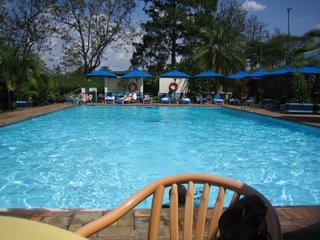...and Sunday (feat. Daryl Hannah)
My friend Faycal, who sings every Saturday night at Kivu Sun, invited me to join him at church on Sunday. Unlike others, he did not proselytize. He just said it would be fun. So I decided to go.
We were supposed to meet at 9 am, but he showed up late. “Guesswhatguesswhatguesswhat!!” Faycal was bouncing. He was so jumpy that I told him he reminded me of a squirrel on crack. “I met Daryl Hannah last night!” Apparently Daryl Hannah (of Kill Bill, etc.) was visiting the gorillas, and was staying at Kivu Sun with her 30-person entourage. “She thought my songs were tight.” Faycal has a funny way of speaking. I can’t tell if he’s deliberately trying to sound like a thug, or if it’s just because he learned English primarily through rap music. Daryl Hannah “wanted all his records,” and Faycal frantically spent the morning burning songs he had recorded onto a disc. He saw her approval as his big break into the music world. After I calmed him down, we went to church.
The Restoration Church sits atop a hill that overlooks the town of Gisenyi and the lake, a breathtaking view. The church itself is typical of Rwandan architecture—rectangular, with brick and mortar walls, and a roof made of corrugated metal and terracotta tiles. Inside, it looks unfinished; the floor is made of rocks and dirt, not concrete, and the walls are the same inside as they are outside. There is a stage, behind which are draped long sheets of white and light blue polyester fabric, punctuated by matching plastic bows, like the kind you stick on birthday presents. The stage is equipped with a sound system so that everyone can hear (the building is so massive that it can hold at least 2,000 people) and various instruments: a drum set, a keyboard, and several guitars.
I was worried that we were very late, but Fayçal told me that we were fine on time. “Church is from 9 to 12,” he said. He had conveniently forgotten to mention that. There is music until 11, when the preacher finally begins.
As expected, the church’s choir was singing. Their songs were briefly interrupted by readings of psalms (I know this because Fayçal was translating everything for me). This was followed by 5 presentations by congregants of ways that God touched their lives (stories included how God was able to overcome witch spells), and an interpretive dance by several dispassionate teenagers. (Think Napoleon Dynamite set to Christian music.) The latter was, maybe, the funniest thing I’ve ever seen in church. Ever. Funnier still because the audience was steely-faced.
Then a guest pastor came up, and began to lecture violently. When I say “violently,” I mean it. He started jumping in the air, touching his knees to his chin, shaking his fist, and he COULDN’T seem to CONTROL the LEVEL OF his VOICE. He shouted into the microphone, making me jump every time.
When I inquired why he was so angry, Faycal said, “Oh, he’s not mad. He’s just telling the story of Noah’s Ark. That part was about how God wanted three levels.”
And I thought he had been screaming about the apocalypse. He went on for an hour, making kids cry. In our boredom, Faycal and I started playing with a baby, who peed in our laps when the pastor started yelling about friendship with God. When I left, my eardrums were ringing, like after a concert.
We headed to Kivu Sun afterward, so Faycal could leave his CDs at the front desk for Daryl Hannah. To our surprise, she walked in at the same time we did.
She’s enormous. She’s also kind of shaggy. Not sleek and viper-ish like in Kill Bill. But she was very polite. I shook her hand and told her that it was rare to run into another American. Then she ran off to have her designer jeans washed.



